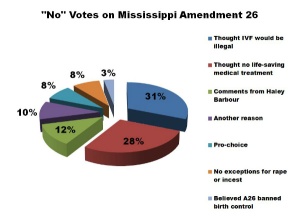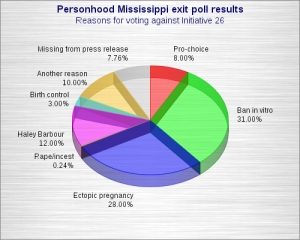The fate of abortion and reproductive rights hung in the balance as Mississippi became a state divided by an initiative attempted (and failed) in a dozen states before.
According to a press release from Colorado-based parent organization Personhood USA, local members conducted a poll to discover what factors most influenced citizens to vote against Initiative 26 when it was predicted to pass without problem.
When Personhood Mississippi came to be in February 2010, the movement took hold overnight and sustained momentum for the next two years. Those opposed to the concept speculated that the organization needed a conservative, religious state to pass the measure to get the ball rolling on the nation and fought tooth-and-nail against the amendment.
Hickory Flat resident Les Riley founded the Personhood movement in Mississippi and has dedicated much of his time over the past few years to the progression of the controversial legislation. Since the surprising loss by more than 100,000 votes, Riley and other distraught supporters have focused on finding the cause behind the failure.
Over the past few months, the debate exploded over the effect on women’s reproductive health and multiple forms of birth control, including Plan B emergency contraceptives and The Pill, prescribed to millions of women.
Much discussion was also focused on the fate of reproductive health services such as in vitro fertilization and treatment for ectopic pregnancies. Changing the definition of “person” to include every human being from fertilization would cause treatment options for couples seeking reproductive assistance and for women in danger from a misplanted egg to become more complicated and influence doctors to stray away from offering the services.
The results show approximately 60 percent of those polled voted against the initiative because of one of these two reasons; however, Riley and many supporters contest that these were merely some of the lies from Planned Parenthood meant to confuse and scare citizens.
“Planned Parenthood pulled the wool over the eyes of Mississippians, and I believe that voters will be shocked to learn the truth,” Riley said in the press release. “They must have been desperate to lie about so many things so often.”
Personhood USA also reports that the smallest percentage of participants were concerned with the lack of exceptions for abortion in the case of rape or incest.
Despite multiple attempts, Riley declined to comment by the time of publication.
The 21-word initiative caused confusion among thousands of Mississippians, including Gov. Haley Barbour. The weekend before the election, a statewide advertisement, sponsored by Mississippians for Healthy Families, featured Barbour on MSNBC earlier in the week expressing his concern about the ambiguity of the wording and lack of information about the repercussions.
“I believe life begins at conception, but unfortunately, this Personhood amendment doesn’t say that,” Barbour said in the nationally televised interview. “I am concerned about the ramifications on in vitro fertilization, ectopic pregnancies. That concerns me, I have to just say it.”
Soon after, reports flooded the wire that Barbour had already voted in favor of the initiative via absentee ballot before the interview, but the damage was done. The lack of confidence in the words of the governor caused a major sway in voting patterns, changing the mind of 12 percent of those polled.
 Much like the amendment itself, the details of the exit poll raise more questions than they provide answers. While the press release has been public for 10 days, little raw data and statistics exist.
Much like the amendment itself, the details of the exit poll raise more questions than they provide answers. While the press release has been public for 10 days, little raw data and statistics exist.
Approximately 800,000 Mississippians voted in the statewide general election, yet only 10,000 were interviewed for the poll. Beyond the survey sample size, there is no information about how the survey was conducted or how the participants were chosen.
Furthermore, the closing paragraph mentions that of those polled, 24 voted against the initiative because of the lack of exceptions for victims of rape and incest. In the accompanying pie chart, this option is represented at 8 percent instead of the mathematically correct 1 percent, throwing off the entire graph.
 “It’s impossible to take anything Personhood has to say about this poll at face value when they can’t even get the math correct,” Cristen Hemmins, avid opponent of the amendment, said.
“It’s impossible to take anything Personhood has to say about this poll at face value when they can’t even get the math correct,” Cristen Hemmins, avid opponent of the amendment, said.
Hemmins has followed the movement since Riley introduced it and quickly became one of the main voices against the amendment after telling her story at multiple public hearings while surrounded by a sea of supporters.
While attending Millsaps, Hemmins was abducted from her dormitory parking lot. The two teenage boys repeatedly raped her in a vacant lot and shot her twice when she fled to a nearby gas station, once in the leg and once in the back.
“If ‘no’ voters’ fears of the extreme consequences Initiative 26 could have on healthcare for women in this state were only ‘scare tactics’ and ‘lies,’” Hemmins rants, “why is Personhood Mississippi even now changing the wording and attempting to make their revised forthcoming legislation less vague and far reaching?
The main point of the press release is to force the fault on Planned Parenthood, yet many of the statements can be contradicted not just from speculation and opinion, but from the mouths and hands of Personhood members and supporters.
On Oct. 31, Walter Hoye of Personhood USA appeared on NPR’s The Diane Rehm Show to defend the movement and differentiate the fact from fiction. Rehm asked about the fate of birth control, and Hoye responded that any form that terminates a human life would be impacted by the measure, including the IUD and birth control pills.
After this incident, many supporters defended the notion that The Pill wasn’t at risk, but they made the mistake of putting the information in print.
The Personhood Initiative organization posted a free booklet with a question and answer section. The third question on the list refers to the safety of birth control, and the literature states that any birth control containing an abortifacient would be affected but others would not.
The book also links to a website organizing the different types into one category or the other. Of the 15 forms listed, five would remain legal, including the male and female condom; however, other than the condom, the most popular and prevalent forms such as the Ortho Evra patch and NuvaRing would be restricted if not outlawed.
Much like Hemmins, Elizabeth Feder-Hosey has followed the path of the initiative closely for her work with Law Students for Reproductive Justice.
As an intelligent woman, she is most insulted Riley implies that those who voted against the amendment were uneducated on the facts and tricked by Planned Parenthood.
“Mississippians are smart enough to comprehend the logic behind declaring a fertilized egg to be a person,” Feder-Hosey said. “The numerous doctors’ groups and religious organizations played a stronger roll in assisting Mississippians in their decision-making. The statements by Mr. Riley are a testament to his not understanding what Mississippians truly value—the lives of women that bring life into this world.
“Initiative 26 was defeated by passionate Mississippians, not Planned Parenthood.”
While some of the statistics in the Personhood Mississippi press release could be correct, the lack of proof to back the numbers and the inability for members to stay consistent leaves many wondering how honest of a representation it is of the Mississippi population.
“This press release completely leaves out the fact that we defeated it through our grassroots effort,” Hemmins said. “There were hundreds, if not thousands, of Mississippians across this state who realized how dangerous passage of this extreme initiative would be for women in our state, and through our personal efforts, we defeated Initiative 26 resoundingly. Thank goodness.”